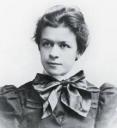In an effort to understand Pauline Einstein’s (Albert’s mother) outright rejection of her son’s love for Mileva Maric, I did some research on Jewish family values in Germany from 1870 -1900. The obvious answer might be that Mileva was raised as an Eastern Orthodox Christian. But despite Hermann Einstein (Albert’s father) listing himself as Israelitic on Albert’s birth certificate, the family was decidedly non-religious, a point of pride with his father, so Mileva’s not being Jewish would not explain his mother’s outrage. In fact, the family had sent Albert to a Catholic school in Munich for his elementary education and his mother had no objection when he fell in love with Marie Winteler while he attended the Cantonal school in Aarau. Marie was not Jewish, and still, Marie and Pauline carried on a fond correspondence.
It happens that between 1870 and 1900 Jews were enjoying a heyday in Germany and, far from isolating themselves in ghettos, were doing what they could to erase distinctions between themselves and their Gentile neighbors. The bourgeois culture to which Hermann and Pauline aspired, to distinguish themselves from the habits of the laboring classes, assigned status to households where women did not work outside the home. Instead, the wife and mother was the mediator between the intimate space of the household and society at large. It was her task to raise children that maintained both the family’s religious observances and adopted the mores of her middle class German neighbors. She was to maintain Germanic standards of cleanliness and orderliness thought essential to cultivating hardworking, upright citizens.
I’m reminded of the values that governed my mother’s life in American culture of the 1950’s and 60’s. My family was not Jewish, but my maternal grandmother’s maiden name was Gumprecht. Despite having a BA in speech from Ohio Wesleyan University, my mother devoted herself to laundry, cleaning, and her one creative outlet–gardening. What about cooking? She was singularly uninspired as a cook. The few recipes she made, such as the Betty Crocker red binder meatloaf, she followed to the letter, even measuring out breadcrumbs. Anytime she made anything without specific measurements–such as sloppy joes the Girl Scout campfire way–she required myself or my father to taste and tell her what to add. That said, we ate at home, around a dinner table, nearly every night–food she had prepared. Not working enabled her to do all kinds of volunteer work. She was my Girl Scout leader for years and drove myself and my brother to our piano and dance lessons. She taught adult Sunday school at our church and volunteered as a docent at the Dayton Art Institute. When I danced with the Dayton Ballet Company, she was the founding president of the support organization, The Friends of the Dayton Ballet. All this said, and given the skills she brought to those extra-household contributions, she didn’t foresee women moving out of the household. If I complained about a school assignment (I particularly hated any rote memory work) as in “Why do I have to memorize Portia’s “quality of mercy” speech?”–her answer was invariably, “So you have something to think about when you’re ironing.”
It’s thereby not hard for me to understand Pauline Einstein’s priorities. Enter Albert, intent on living and thinking outside any box his mother might build. He called her bourgeois values “philistine” and flaunted them at every opportunity, dropping Marie Winteler for being too much like his mother. Instead, he loved a Serbian woman–a backward culture of gypsies, to his mother’s mind–one who aspired to work as a physics teacher.
So, without meeting Mileva, Pauline could object to Albert’s undermining all she had done to ensure the family was upwardly mobile. Ideally, his spouse would be one of his cousins, and to that end, she invited relatives to visit them at Mettmenstetten each summer during their stay at the Hotel Paradies in the Alps. Albert was happy enough to play his violin for the ladies assembled, even playing duets with the cousins she paraded past him, but he was determined to marry Mileva. Was it love? Or the need to upend his mother?


